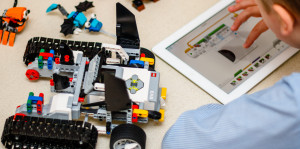How much of your day do you spend at a computer? Could I have a career in a tech field, even if I’m not doing GCSE maths and computer science? What’s the most exciting tech you use? And did you have heroes who inspired you to do your job?
These are some of the questions students submitted online to expert industry panellists at the first-ever Virtual Digital Explorers that launched in late June 2020. It was a big change from what had been planned.
Before COVID-19, Tata Consultancy Services (TCS) staff and skills partners from across UK industry had planned to travel to Liverpool. They had been due to host hundreds of local teenagers for a launch week of hands-on tech challenges and inspirational career mentoring. Venues were booked.
But instead, more than 9,000 students from all over the UK went online, becoming Virtual Digital Explorers. This is the story of how a crisis turned into an opportunity − with the commitment and energy of volunteers at its heart.
Collaborating on a solution
Over the past two years, TCS has hosted six Digital Explorers with the Engineering Development Trust (EDT). Last year alone, events in Bristol, Manchester and Edinburgh engaged 2,500 12 to 17 year-olds in a series of digital workshops and mentored sessions.
Digital Explorers is part of TCS’s wider outreach work, designed to inspire more young people to choose science, technology, engineering and mathematics (STEM) careers and help plug a UK skills gap that means 60% of tech companies struggle to fill vacancies.
But when coronavirus halted the planned Digital Explorers programme, TCS had to rethink the whole programme. The Corporate Sustainability team worked rapidly with partner charity EDT to devise a digital-only alternative. By leveraging TCS iON Digital Glass Room™ − already free to use for those in need − what Virtual Digital Explorers lacked in face-to-face networking, it made up for in scale and geographical reach.
The launch week contained many of the elements that made previous Digital Explorers events so popular with young tech fans and their teachers: insights into in-demand skills, glimpses of the future world of work, some myth-busting about techies and digital design challenges to earn students Industrial Cadets accreditation.
Virtual experts
In ‘Meet the Mentor’ Q&A sessions, volunteer panel members from companies including General Electric (GE), GlaxoSmithKline (GSK) and TCS discussed their own career paths, typical working days and the digital transformations that the future of work will bring. They also took students’ questions.
Omar Sharif, from TCS, told pupils he wanted to challenge tech stereotypes. “My typical week isn’t defined,” he said, “but central elements include ideations and lots of interaction with business and users.”
Follow your passions was the advice from mentor Sally Cockayne, a maths undergraduate on an Industrial Cadets placement with GSK. Cockayne said she had found working on drugs trials at GSK especially rewarding. “The best part for me is having a direct impact on people’s lives,” she said. “Follow your interests and keep your options open, and you’ll find the role that fits.”
Placement student, Isabel Elliot, impressed the online audience with her account of working alongside a ‘liquid-handling robot’ in her lab. Meanwhile, GE’s Director of Operations, Mike Brown, spoke of the value of outside interests.
“Show employers you can function away from the computer screen,” he said. TCS Quality Manager, Rajat Sharma, added that digital knowhow needed to go hand-in-hand with soft skills like communication and teamwork.
Changing the dynamic
Another strength of the Virtual Digital Explorers toolkit is the ability of digital to provide variety and tailor-made programmes. Live panels and Q&As as complemented by short videos and mini-tutorials, as well as inspiring activities.
The youngest cohort, the seven to nine year-olds, were tasked with reinventing a household item as a smart device. Once achieved, and after some basic coaching in app design, they could then move on to devising an app to control their device.
Older students, aged 10 or more, were encouraged to think about what a technology career could hold for them – and how to get there. They were also challenged to create their own start-up – identifying their market, branding their company and even drafting job descriptions for early recruits.
While there was no formal assessment, a rewards-based approach maintained enthusiasm and commitment. All modules had to be completed to earn Challenger level accreditation from Industrial Cadets, which could be included on CVs.
But whatever the activity, students were in control. Whether at home or at school, during live week or later, they could work at their own speed, throughout the summer.
“Working with TCS, we’ve made this modular Digital Explorers as flexible as it can possibly be,” says Nikki Elliot, EDT’s Head of Industry Engagement.
Continuing the conversation
Students were asked to evaluate their virtual experience and responses will be collated over coming weeks. Frequently asked questions − and responses to them − will remain on the platform as a resource going forward, as will pre-recorded mentor sessions.
And there are already signs that the virtual events have had an impact. Three-quarters of young people who attended recent Digital Explorers events said they were more likely to consider a STEM career as a result.
Schools have been enthusiastic about the virtual version. A teacher in Manchester told TCS: “Students who have accessed the resources have given hugely positive feedback. It’s also been a much-needed change to their ordinary schoolwork.”
Expanding impact
Elliot says the events have been a game-changer for reaching less well-served communities. “The beauty of previous events was that young people got to mix with industry professionals and other students and get hands-on with the technology. But the magic of this is that it breaks down the very real geographical barriers that prevent schools attending live events.
“We’re reaching schools we work with regularly, often in deprived or isolated areas, but thousands more students besides, right around the UK.”
Adapting the programme to extraordinary times had been a valuable experiment, agreed TCS Director of Corporate Sustainability, Yogesh Chauhan. “At a time when students, teachers and parents are being challenged in whole new ways,” he said, “it’s been rewarding to work with EDT, industry colleagues and our own volunteers to produce an imaginative solution.
“Virtual Digital Explorers was very ambitious and, despite some early teething problems, overall it is working very well. Going virtual has tested out new ways for us to engage this key age group in large numbers. That’s worth exploring further.”

